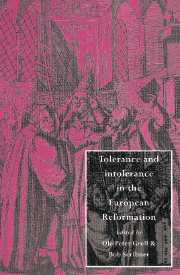Book contents
- Frontmatter
- Contents
- List of contributors
- Preface
- Dedication
- 1 Introduction
- 2 The travail of tolerance: containing chaos in early modern Europe
- 3 Preconditions of tolerance and intolerance in sixteenth-century Germany
- 4 Heresy executions in Reformation Europe, 1520–1565
- 5 Un roi, une loi, deux fois: parameters for the history of Catholic-Reformed co-existence in France, 1555–1685
- 6 Confession, conscience and honour: the limits of magisterial tolerance in sixteenth-century Strassburg
- 7 One Reformation or many? Protestant identities in the later Reformation in Germany
- 8 Toleration in the early Swiss Reformation: the art and politics of Niklaus Manuel of Berne
- 9 Tolerance and intolerance in sixteenth-century Basle
- 10 Exile and tolerance
- 11 The politics of toleration in the Free Netherlands, 1572–1620
- 12 Archbishop Cranmer: concord and tolerance in a changing Church
- 13 Toleration for Catholics in the Puritan revolution
- 14 The question of tolerance in Bohemia and Moravia in the age of the Reformation
- 15 Tolerance and intolerance in sixteenth-century Hungary
- 16 Protestant confessionalisation in the towns of Royal Prussia and the practice of religious toleration in Poland-Lithuania
- Index
15 - Tolerance and intolerance in sixteenth-century Hungary
Published online by Cambridge University Press: 07 December 2009
- Frontmatter
- Contents
- List of contributors
- Preface
- Dedication
- 1 Introduction
- 2 The travail of tolerance: containing chaos in early modern Europe
- 3 Preconditions of tolerance and intolerance in sixteenth-century Germany
- 4 Heresy executions in Reformation Europe, 1520–1565
- 5 Un roi, une loi, deux fois: parameters for the history of Catholic-Reformed co-existence in France, 1555–1685
- 6 Confession, conscience and honour: the limits of magisterial tolerance in sixteenth-century Strassburg
- 7 One Reformation or many? Protestant identities in the later Reformation in Germany
- 8 Toleration in the early Swiss Reformation: the art and politics of Niklaus Manuel of Berne
- 9 Tolerance and intolerance in sixteenth-century Basle
- 10 Exile and tolerance
- 11 The politics of toleration in the Free Netherlands, 1572–1620
- 12 Archbishop Cranmer: concord and tolerance in a changing Church
- 13 Toleration for Catholics in the Puritan revolution
- 14 The question of tolerance in Bohemia and Moravia in the age of the Reformation
- 15 Tolerance and intolerance in sixteenth-century Hungary
- 16 Protestant confessionalisation in the towns of Royal Prussia and the practice of religious toleration in Poland-Lithuania
- Index
Summary
I should like to begin by making two observations concerning the method and substance of my contribution. Firstly, this chapter is bound to give the impression of being circuitous and based on inappropriate evidence. Hungarian history of the early modern period, especially concerning non-economic and non-political matters, tends to generate this impression in scholars used to the quantity and quality of sources available in Western European countries. Compared with such countries, Hungary is short of sources illustrating local and personal history. Thus, the matriculation of Hungarian students at universities abroad is well documented in the matriculation lists, most of them published, of the respective institutions, but we can only surmise that these students had experienced primary and secondary schooling, since sources relating to schools and schooling in Hungary are conspicuous by their absence.
Two explanations for the shortage of sources to early modern Hungarian history have become prevalent among historians. One emphasises the backwardness of sixteenth- and seventeenth-century Hungary, claiming that very few written sources were produced. The other points out that, though Hungary was not the Netherlands, it still produced the records of a kind characteristic of most Western European countries of this period, but most were destroyed by the wars and the political upheavals in the early modern period. I belong to the latter school of thought and regard my view as confirmed by much of the surviving evidence. A case in point is the early modern central government of Transylvania, in whose archives no government sources from this period have survived.
- Type
- Chapter
- Information
- Tolerance and Intolerance in the European Reformation , pp. 249 - 261Publisher: Cambridge University PressPrint publication year: 1996
- 2
- Cited by



